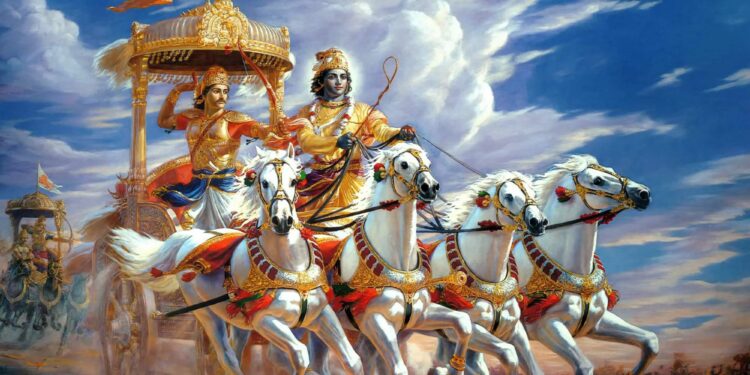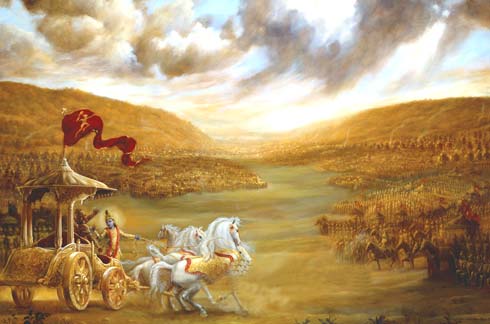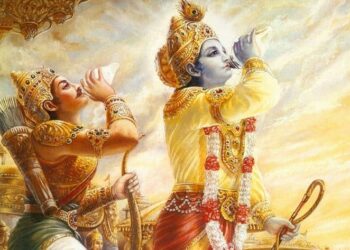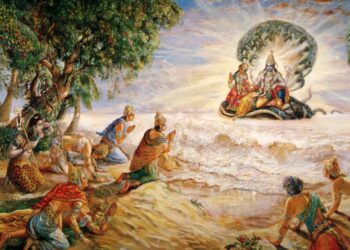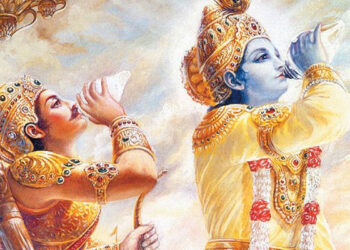TEXT 18
avyaktād vyaktayaḥ sarvāḥ
prabhavanty ahar-āgame
rātry-āgame pralīyante
tatraivāvyakta-saṁjñake
SYNONYMS
avyaktāt—from the unmanifest; vyaktayaḥ—living entities; sarvāḥ—all; prabhavanti—become manifest; ahaḥ-āgame—at the beginning of the day; rātri-āgame—at the fall of night; pralīyante—are annihilated; tatra—into that; eva—certainly; avyakta—the unmanifest; saṁjñake—which is called.
TRANSLATION
At the beginning of Brahmā’s day, all living entities become manifest from the unmanifest state, and thereafter, when the night falls, they are merged into the unmanifest again.
TEXT 19
bhūta-grāmaḥ sa evāyaṁ
bhūtvā bhūtvā pralīyate
rātry-āgame ‘vaśaḥ pārtha
prabhavaty ahar-āgame
SYNONYMS
bhūta—grāmaḥ—the aggregate of all living entities; saḥ—these; eva—certainly; ayam—this; bhūtvā bhūtvā—repeatedly taking birth; pralīyate—is annihilated; rātri—of night; āgame—on the arrival; avaśaḥ—automatically; pārtha—O son of Pṛthā; prabhavati—is manifest; ahaḥ—of daytime; āgame—on the arrival.
TRANSLATION
Again and again, when Brahmā’s day arrives, all living entities come into being, and with the arrival of Brahmā’s night they are helplessly annihilated.
PURPORT
The less intelligent, who try to remain within this material world, may be elevated to higher planets and then again must come down to this planet earth. During the daytime of Brahmā they can exhibit their activities on higher and lower planets within this material world, but at the coming of Brahmā’s night they are all annihilated. In the day they receive various bodies for material activities, and at night they no longer have bodies but remain compact in the body of Viṣṇu. Then again they are manifest at the arrival of Brahmā’s day. Bhūtvā bhūtvā pralīyate [Bg. 8.19]: during the day they become manifest, and at night they are annihilated again. Ultimately, when Brahmā’s life is finished, they are all annihilated and remain unmanifest for millions and millions of years. And when Brahmā is born again in another millennium they are again manifest. In this way they are captivated by the spell of the material world. But those intelligent persons who take to Kṛṣṇa consciousness use the human life fully in the devotional service of the Lord, chanting Hare Kṛṣṇa, Hare Kṛṣṇa, Kṛṣṇa Kṛṣṇa, Hare Hare/ Hare Rāma, Hare Rāma, Rāma Rāma, Hare Hare. Thus they transfer themselves, even in this life, to the spiritual planet of Kṛṣṇa and become eternally blissful there, not being subject to such rebirths.
TEXT 20
paras tasmāt tu bhāvo ‘nyo
‘vyakto ‘vyaktāt sanātanaḥ
yaḥ sa sarveṣu bhūteṣu
naśyatsu na vinaśyati
SYNONYMS
paraḥ—transcendental; tasmāt—to that; tu—but; bhāvaḥ—nature; anyaḥ—another; avyaktaḥ—unmanifest; avyaktāt—to the unmanifest; sanātanaḥ—eternal; yaḥ saḥ—that which; sarveṣu—all; bhūteṣu—manifestation; naśyatsu—being annihilated; na—never; vinaśyati—is annihilated.
TRANSLATION
Yet there is another unmanifest nature, which is eternal and is transcendental to this manifested and unmanifested matter. It is supreme and is never annihilated. When all in this world is annihilated, that part remains as it is.
PURPORT
Kṛṣṇa’s superior, spiritual energy is transcendental and eternal. It is beyond all the changes of material nature, which is manifest and annihilated during the days and nights of Brahmā. Kṛṣṇa’s superior energy is completely opposite in quality to material nature. Superior and inferior nature are explained in the Seventh Chapter.


